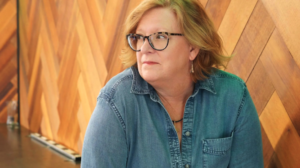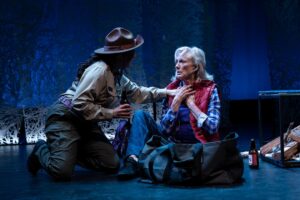
By: Robert St. Martin
Pasadena, CA (The Hollywood Times) 5/1/2024 – Last Saturday was the opening night of a new play at the Boston Court Theatre in Pasadena, with the world premiere of The Body’s Midnight, written by Tira Palmquist.

“How do you make a memory palace of your whole life?” asks Palmquist. “This play is about how weird and beautiful and surprising the world is, how we have to be open to that and be willing to improvise in life. You can’t plan your way through every celebration, or through every adversity.”
The Body’s Midnight, directed by Jessica Kubrzanksy and a co-production of IAMA Theatre Company and Boston Court Pasadena, is a surprisingly poetic play about the complicated, ridiculous, awe-inspiring trajectory of life. What does it mean to discover America? Anne (Keliher Walsh) and David (Jonathan Nichols–Navarro) are determined to find out as they embark on the perfect American road trip.

Featuring a strong cast of veteran IAMA actors, The Body’s Midnight is a powerful production full of gallows humor and philosophical poignancy. Anne and David have a map, an impressive list of sights to see, and an itinerary that should put them in St. Paul, Minnesota, home of daughter Katie and son-in-law Wolf (Sonal Shah and Ryan W. Garcia), just in time for the birth of their first grandchild.
Anne is 55-ish, a poet and teacher. Fierce, independent, quick, witty – and stubborn. Her husband, David, is much the same: an academic who studies the theater of the Restoration Period and masks his emotions with clever banter.
But soon their perfect plan is derailed by a troubling diagnosis and the beautiful impermanence of the world around them. As Anne and David veer off of their intended path, they are forced to grapple with the unavoidably messy and breathtaking journey of their lives.


“It speaks to so many things: to long-time marriage, to mothers and daughters, to what we pass on and what we pass down, to aging, to memory loss, and to the way the world disappears around us,” said director Kubzansky about the play. “I love the way it moves to define what’s happening in different spaces in a highly theatrical way – a reality space, a surreal space, a phantasmagorical space, a memory space.”
Like many a great saga or odyssey, our heroine Anne sets out on a road trip. Fun! What could possibly go wrong? Anne does not encounter the monsters and mayhem of the classical heroic cycle, but her path is strewn with obstacles. Most significant of these are compounding changes in her brain.

As foreshadowing, the play opens with Anne in deep, silent meditation over a lime. She stands in a kind of hazy light, surrounded by shadow. She’s thinking, talking to herself: there is the memory of a lime tree with its three perfect limes, long ago, and the last visit from her mother long, long ago, 10, maybe 20 years ago, the mother 90 or past 90, long gone.

The poignancy of this seemingly small scene reverberates through the play, even as the characters merrily drop abundant profanity and tease and laugh their way along the eastbound freeways from California. At one point mid-way through the story, Anne remarks about the road trip, “We could have a terrible trip, and I might not remember that.” A few moments later, she struggles to recall the name for the “Vulcan mind meld.” Anne is losing her memory.
The old cowboy song, “The Streets of Laredo” (“I see by your outfit / That you are a cowboy”…), reverberates throughout the play. Playwright Palmquist explained it is a song from his childhood.
“Things like songs weave in and out of our consciousness in certain mysterious ways,” Palmquist said. “The song, with its old-timey lyrics – ‘all dressed in white linen and cold as the clay’ – tracks with the play’s narrative of loss.”
This is a literal story of aging, of driving across the country and seeing tiny towns disappearing. It’s like sitting in vigil at the bedside of someone who’s dying, wondering how we can forestall it. I feel a visceral panic about that passing. We can’t save the person, but we can be here to bear witness.”
Real or an apparition, Anne encounters in the California desert a character named Wilson (one of many parts played by Ryan W. Garcia), who owns a general store in St. Elmo, a mining ghost-town somewhere between the points of arrival and departure. Anne wonders if there are real ghosts in a ghost town. Then suddenly she sings an incantation.

Wilson cautions Anne, “You’ve gotta know what you’ll do when you’re lost.” Despite Anne’s protests, it’s a “when,” not an “if.” On her way to visit her daughter Katie as she delivers Anne’s first grandchild, it’s impossible not to feel a ripple and shudder of self-recognition. Is this the price of a loss of memory experienced by so many after age 50? “The ‘midnight’ is the place of facing the unknown. For people who are over a certain age, loss and mortality is the great unknown.”
The play’s evocative title, Palmquist said, was discovered during an actual conversation with her husband. She describes feeling out-of-sync, having “…flown across a bunch of time-zones…I remarked, ‘It’s midnight in here, m*****f***ers,” Palmquist recalls. The loss of memory is always a concern as we age.
As Anne sees it (in the words of Palmquist): “You have gone for just a moment, / And I stand in the map of what I will / leave behind. Already / it is slipping, what I just prepare. / Here is where you will remember me. … . Don’t worry: I will leave so many signposts.”
Palmquist is known for her writing that merges the poetic, personal and political. Her most produced play, Two Degrees, was produced by places like the Tesseract Theater in St. Louis and Prime Productions at the Guthrie, after its premier at the Denver Center. As an established playwright, her work The Way North was a finalist for the O’Neill, an Honorable Mention for the 2019 Kilroys List and was featured in the 2019 Ashland New Plays Festival.

One of the philosophies shared by IAMA and Boston Court is the development-to-full production pipeline for new work. During IAMA’s current “Sweet 16” anniversary season, the company produced two new plays it commissioned from Los Angeles-based playwrights: Radical or, are you gonna miss me? by Isaac Gómez and Arrowhead by Catya McMullen.
Similarly, The Body’s Midnight was developed with Boston Court’s Playwrights Group and given a staged reading as part of that company’s 19th annual New Play Reading Festival before being selected for the current co-production.
The Boston Court Theatre is located at 70 N Mentor Ave, Pasadena, CA 91106, adjacent to the comedy club The Ice House. The Body’s Midnight runs April 27 through May 26. Tickets cost between $24 to $59. Please view the Boston Court website for ticket price details: bostoncourtpasadena.org or call (626) 683-6801.